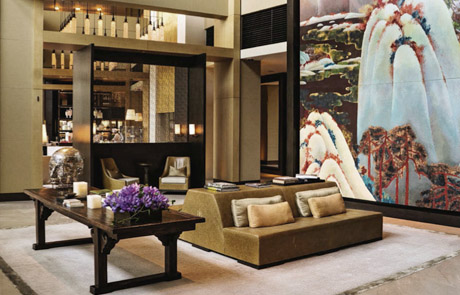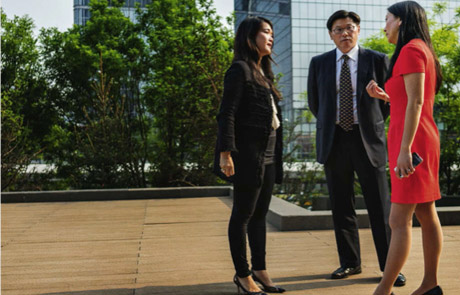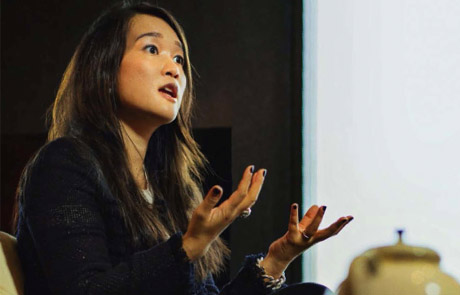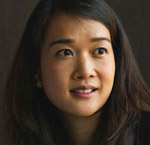In an industry that often defaults to conformity, Rosewood Hotels & Resorts ® is a distinctive collection of highly individual, luxurious, residential-style hotels and resorts, each embracing its location’s history, culture, and sensibilities. When Sonia Cheng was appointed chief executive of Rosewood Hotel Group she quickly emerged as one of the world’s leading figures in the hospitality industry. Talking to THE FOCUS, Cheng describes the group’s unique DNA, the changing nature of hospitality, and how she balances the heritage of a family-owned business with her own fresh approach.
THE FOCUS: How does Rosewood seek to stand apart in the hospitality industry?
Sonia Cheng: Our essence is an all-embracing commitment to “a sense of place.” We reject the cookie-cutter approach in favor of honoring the unique spirit of each property. Our entire team devotes itself to immersing in the local culture of each market, then shaping something precious and unique that celebrates each city. We convey a sense of place through the interior design, the artwork, the accessories, the books that guests find in their rooms, the culinary program … We look for every opportunity to make our guests’ experience true to the particular locale.
Rosewood Beijing, where you are hosting us now, conveys this sense of place to great effect …
Rosewood Beijing is my baby. I worked on it for five years and I know Beijing very well. I started coming here for business before I joined the company, and after staying at many different hotels, I realized there was a gap in the market. Beijing is a city that mixes stunning modernity with rich traditions and we wanted to create a luxury hotel that speaks to that arresting mix. So when visitors arrive here they pass through imposing gates flanked by drag-on statues, beautiful landscaped gardens and, in the lobby, a range of striking art – from calligraphy to mixed media. We wanted a hotel where our guests could experience at a subliminal level the ageless Chinese concept of journey and welcome. All of our properties offer a distinctive sense of place. The Mansion on Turtle Creek, for example, once belonged to a Texan cotton magnate. The Carlyle in New York has hosted every American president since Truman, not to mention European royalty. Rosewood London is a grand Edwardian heritage building steps from Covent Garden. I love the idea of weaving the modern world into heritage buildings.
In which ways is this “sense of place” a response to changing expectations among the travelers you want to attract?
Rosewood’s target customers are what we call “affluential explorers.” They are well-traveled and very sophisticated. They come to a city with a sense of adventure, hoping for a truly authentic journey. So each destination offers an authentically local experience. Here in Beijing, for example, we deliberately didn’t create a Michelin-star kind of restaurant, nor invite in celebrity chefs. We conducted market research into Beijing’s great food experiences and, in particular, what the locals love to eat. When affluent explorers visit a city they want to feel more like locals themselves. they’ve probably been to the Great Wall and the Forbidden City and now they’re looking for more accessible authenticity. So instead of offering fine dining, or French and Italian cuisine, we offer a very modern version of “hot pot” because we know that hot pot is close to the heart of this city. And instead of serving formal Cantonese cuisine in the way that many traditional hotels do, we provide “Country Kitchen,” inspired by China’s village-type home-cooked food. We thought the new generation of travelers would enjoy this. That’s the category of traveler I’m in, so I trusted my sense that this was the right culinary style for the Rosewood Beijing.
“I believe one of the distinguishing features of Rosewood is our reliance on intuition.”

What was the reasoning behind your decision to use Rosewood as the name of the whole group? New World Hospitality already had built a reputation for luxury in Asia and your boutique pentahotels were well-known throughout Europe …
It was a strategic decision, given that Rosewood Hotels & Resorts already had properties around the world and more global awareness than either new World Hotels & Resorts or pentahotels.
New World Hotels & Resorts operates business hotels in first- and second-tier cities throughout China and Southeast Asia, and pentahotels is a boutique European chain that we acquired in 2001. Rosewood is the ultra-luxury brand within the division, and so strategically it made great sense to name the group Rosewood. Bringing this premium brand into our portfolio accelerates our overall position and direction to become a leading global luxury brand.
The hospitality industry faces enormous challenges and ever-changing trends – from Millennials now being the fastest growing customer segment to innovative technology across multiple platforms and devices. How did you go about re-positioning Rosewood in the market after your acquisition?
Rosewood had this wonderfully rich heritage, but its identity was slightly dated and its marketing strategy somewhat conservative and focused primarily on the Americas. So we decided to spend nearly US $ 8 million to change the logo, collateral, and website, and to launch a full-blown advertising campaign throughout Europe and Asia.
Perhaps most importantly, we’ve infused the Rosewood brand with fresh creativity that speaks personally to our customers and their passions. I’m particularly proud of our Rosewood Curators program, which invited influential people and known tastemakers in each market to describe what they love about their location. In New York we had fashion editor Nina Garcia. In Beijing, film director Johnnie To. In London, journalist Piers Morgan. We asked a range of prominent people from the arts, entertainment, and sports to tell us what they love most about their respective destinations, and their responses have informed and inspired our efforts to offer sophisticated travelers an unmistakable sense of place.
Our brand can never stand still, because travelers themselves are always changing. They like certain things now, but five years from now they might like different things. So we need to remain open-minded. We need to be creative. As a company we are constantly trying to evolve and I am constantly pushing the team to bring new, fresh, innovative ideas to the table. And when we ask our Rosewood guests for feedback, we don’t want it sugar-coated because that doesn’t help us. We want to know their real experiences, whether positive or negative, because that’s how we improve.

The interview with Sonia Cheng in Beijing was conducted by Catherine Zhu, Egon Zehnder, Hong Kong, and Paul Liu, Egon Zehnder, Shanghai.
To what extent does Rosewood rely on the science of market research?
We rely more heavily on intuition and personal observation. Affluent explorers have been everywhere and extravagant presentations that used to impress them don’t impress them anymore. What does impress them are simple pleasures, and simple pleasures call for intuition. So if our service associates have seen you once they will remember, for example, that you like hot tea, and when you return they will ask you: “Would you like a hot tea again?” All our hotels have a set of guidelines called “Grand Differentiators” where the associates are encouraged to observe and respond to any hints the guests might offer. Because we are not just serving a guest, we are acting as host and treating the guest as a member of our family. this is integral to our culture. We want to be constantly evolving. We keep our eyes open. Everything informs us. We learn from observing our competitors and we are inspired by companies that are doing things particularly well in retail and consumer products. Being open-minded and absorbing each crucial nuance or detail, this is crucial to our culture. if we just stayed within hospitality we would be closing our minds and our options. But at the core, we trust in our own very strong and unique identity.
I also get a lot of inspiration from travel. Wherever I am in the world I try the latest restaurants, bars, and cultural events and that opens my eyes to what others have created. These can be the smallest things – the design of menus, the way tables are laid, the manner in which guests are served. All of these things can be inspirational. And every time I see something great that we’re not doing I take notes and talk to my team.
How do you ensure that every member of your staff across all geographies is wedded to the culture you describe?
This is probably our biggest challenge, but if we recruit the right people with the right mindset then everything else becomes easier. Skill sets can be learned, but passion and belief in the core philosophy of our brand are much more intangible qualities. Responsibility for staying true to our culture flows from top to bottom – from the Head Office down through the Managing Directors to Human Resources, Sales and Marketing, Food and Beverage, and so on. We all need to walk the talk.
With your properties spread across 18 countries that can’t be easy …
Rosewood has offices in both Hong Kong and the United States, so it’s really not difficult for us to get together. And in a business like ours, maintaining personal connections is essential. We have strategy meetings at least three times a year and then annual managing director meetings where we discuss best practices, share our views, and learn from each other about the challenges in each market.
Our culture is also strengthened by how we invest in our people. Our global management trainee program is highly cross-cultural and designed to develop talent internationally. I host a welcome conference call where I speak to all our trainees about the objectives of this program. We call them our “Hy Flyers” – people whose talents we have identified within the company – and each property has its own Hy Fliers. So whenever I visit our properties I set up a meeting with them to learn from them and to hopefully answer any questions they might have. I have an open door policy because I think it’s important to be as approachable as possible. I also believe in being hands-on and working alongside my management team, so that everyone feels part of the creative process.
“The hospitality industry is still essentially a people business and that requires the personal touch.”
Competition for top talent is always fierce. What skills and attributes matter most to you?
Our culture is firmly based on the concept of relationship hospitality. That means we’re not just providing a service. We’re in the business of long-term relationships. So this is what we seek foremost in our talent. We need people who will make our culture flourish and our guests want to return. These attributes are cross-cultural and form the basis for all our hirings around the world. Obviously local knowledge and an understanding of different markets is an important ingredient as well, as we adapt ourselves to these specific market needs. But the fundamentals should not change. So that’s who we’re looking for – people who want to be in the people business and managers who believe in the fundamental importance of relationship hospitality and all that it stands for.
You mentioned earlier that the travelers you serve are always changing. How does that factor into your talent strategy?
Millennial travelers love technology. They are constantly using their iPhones and iPads. So of course we want people who are attuned to that. We find these skills both within and outside our own industry. At the same time, we think hard about how we use technology. For example, should we ask our guests to use their smart phones as room keys? Technology needs to be functional. It needs to be practical. And it needs to be simple. We will not implement technology in the rooms, or elsewhere, just because everyone else is doing it. Too much automation could damage the soul of the company. We need to know whether the guest is comfortable with the technology and will prefer to use it. Because as I learnt from my father and grandfather, the hospitality industry will always be a people business. You must never lose the personal touch.

Did you always want to be in this business?
Well, I love traveling and have been exposed to the best that travel can offer for most of my life. I grew up surrounded by hotels because my family has been developing hotels for the last 30 years. So it’s always been a passion of mine. But when I graduated from college it was important to me that I carve out my own independence first. So I worked in investment banking with Morgan Stanley and then in private equity at Warburg Pincus. After six years in finance, my father asked me to start a hotel management company, which of course was a once-in-a-lifetime opportunity in learning to become an entrepreneur. Earlier, the opportunities I was given by my family to be educated abroad and see how different businesses work helped me see what travelers and consumers are looking for, particularly in hotels, which is such a dynamic business. It’s not just about business. It’s about culture, marketing, design, finance, operation, and service.
Both your grandfather and your father are held in high esteem as successful business leaders of exemplary integrity. What have you learned from them about leadership?
My father’s first major job was as general manager of a hotel, so he always understood the principle of the hotel business being a people business. I spoke to him a lot about this growing up and he always emphasized the point that you have to invest in people – because once you have the right people, everything else falls into place. He stressed that you can have the best design, advertising, and marketing strategy in the world, but without the right people you’ll never be successful. So for the first two years after joining the company I did nothing but hire the best professionals in the industry to join my management team. As you rightly point out, both my father and grandfather have been very successful, in part because they took bold risks and were prepared to invest in long-term opportunities. this has always inspired me to look outside the box and to try and be a visionary myself. you have to be flexible and smart enough to trust your own instincts, but also pay heed to the deep insights that come from the kind of experience that my father and grandfather are obviously able to offer. Perhaps the most important lesson I’ve learned from them is that no matter how successful you may become, do not fall victim to ego and pride. They always say that it is only through humility that you really open your eyes to how the world is changing. Even though my grandfather and father are extremely prominent business figures, they are also very humble and down to earth. They never put themselves on a pedestal and this has earned them great respect, not just within the companies they’ve run, but within the industry as a whole. I find that tremendously inspiring.
“I believe that a good work-life balance makes you a better mother and also a better CEO.”

You’ve been quoted as saying that you want to take the hospitality industry to the next level. What does that next level look like?
If I may say so, I think it looks like what we’ve created with the opening of Rosewood London in 2013 and Rosewood Beijing last year. We are taking all our wonderful properties to the next level with our approach to relationship hospitality. We are also very excited about the re-opening next year of Hôtel de Crillon in Paris, which is nothing less than the rebirth of a legendary property. We are opening in Phuket, Phnom Penh, dubai, Puebla (Mexico) and Paris next year, and in Sanya and Guangzhou in China in 2018, and in Jakarta the year after that. And all the feedback tells us we’re changing the landscape for the better.
How important is it to you that Rosewood is a family business?
We don’t actually treat this company as a family business. We treat it as a professional business, in the sense that we need to make money and ensure the business is successful. However, I do think being a family business is a competitive advantage in terms of delivering the relationship hospitality that defines Rosewood, particularly all the personal touches. We are free to shape our properties and devote all our efforts to fulfilling that vision. We can put all our energies into what we believe makes all the difference to our guests.
How do you balance the hugely demanding roles of being both aCEO and the mother of two young children?
To be honest, it’s often a struggle, but I’m always seeking the balance that makes me a better mother and also a better CEO. When I’m at work, because I know I have my children to go home to, I’m more productive and efficient. And if I’ve had a productive working day I can return home with a sense of satisfaction that helps me then focus my attention properly on my children.
Do you see yourself as a role model for other young women?
Professionally, I don’t think of myself much in terms of gender or about being a female role model. I don’t see myself as any different from a male CEO, except that, yes, if you’re a mother you may be somewhat more challenged to maintain a healthy work-life balance. But other than that, in a work environment we’re no different than men.
As a member of the third generation of an entrepreneurial family, do you hope that your children will one day follow in your footsteps?
My hope is that, like me, they will have the freedom to find out what they love. Because for any business to be successful, or any entrepreneur to become successful, you need this quality of passion for what you do. And you need to have the confidence and faith to commit to that. So I want my children to have as much freedom as possible to discover what it is that drives and motivates them.

Sonia Cheng
Sonia Cheng was born in 1980. After graduating from Harvard University with a degree in Applied Mathematics, she worked in investment banking at Morgan Stanley, then joined Warburg PincusLLC in 2005, where she specialized in real estate investments. Cheng joined New World Development in 2008. At the age of 30 she was appointed chief executive of New World Development’s Rosewood Hotels Group. Cheng is also executive director of New World Development Company Limited and New World China Land, which comprise one of the largest conglomerates in Hong Kong. She chairs the advisory committee of the School of Hotel and Tourism Management at the Chinese University of Hong Kong. In 2012 Cheng married food and beverage entrepreneur Paolo Pong Kin-yee, and was famously reported to have cut short her honeymoon to return to work. She told Hong Kong Tatler magazine last year: “It was a simple choice. I know my husband loves me and I don’t need a week on the beach to prove that.” Cheng, her husband, and their two children live in Hong Kong.
Rosewood Hotel Group
Rosewood Hotels & Resorts ® was founded in 1979 by Texan heiress Caroline Rose Hunt, who converted an historic mansion in Dallas into a celebrated restaurant and hotel, the Mansion on Turtle Creek. This was the first in a line of luxury hotels operated by the Dallas-based group until its sale in 2011 to the Hong Kong-based New World Hospitality, part of New World Development Company Limited. As of June 2015, New World Development’s Rosewood Hotel Group was managing 55 hotels in 18 countries across North America, Europe, the Middle East, Asia, and the Caribbean. CEO Sonia Cheng hopes to more than double this number by 2020.
PHOTOS: DAVID HOGSHOLT
 Shaping Successions
Shaping Successions
 Advancing Governance
Advancing Governance
 Discovering Leaders
Discovering Leaders
 Developing Leadership
Developing Leadership